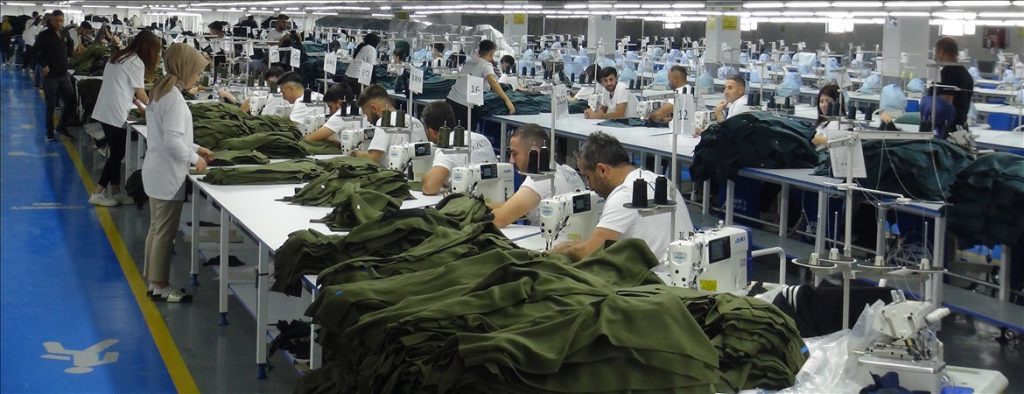BASF and Inditex jointly announce a significant breakthrough in advancing recyclability within the textile industry.
BASF has introduced loopamid®, a polyamide 6 (PA6 or nylon 6), crafted entirely from 100 percent textile waste, providing a groundbreaking circular solution for nylon apparel. Zara has swiftly incorporated this material into a jacket, now available globally, with all components—fabrics, buttons, filling, hook and loop, and zipper—made exclusively from loopamid.
The loopamid innovation by BASF enhances circularity in the fashion sector and facilitates the recycling of polyamide 6
textile waste. This cutting-edge technology allows textile-to-textile recycling of post-industrial and post-consumer textile waste, tolerating fabric mixtures like PA6 and elastane. Notably, loopamid's fibers and materials can be recycled over multiple cycles while maintaining characteristics identical to those of conventional virgin polyamide.
Dr. Ramkumar Dhruva, President of BASF’s Monomers division, emphasizes the milestone reached toward circularity, stating, "Our loopamid has the potential to revolutionize the PA6 market for the better." The collaboration with Inditex demonstrates the feasibility of circularity, marking a crucial step in the sustainable transformation of the textile industry. Efforts are underway to scale up technology for commercial quantities.
Inditex has partnered with other leading groups in the clothing manufacturing industry to seamlessly integrate loopamid into various garment components, including fabrics, zippers, buttons, fillings, hook and loop fasteners, and sewing threads.
ModaRe, a take-back program operated by the charity organization Caritas, classified, sorted and provided discarded textiles as feedstock. The Italian company RadiciGroup has been working in the process of transforming loopamid polymer into various types of yarn with different characteristics.

The multinational Japanese fastening products company YKK and multinational Velcro companies have also played crucial roles in utilizing loopamid polymer to create plastic components for zippers and snap buttons, and hook and loop fasteners.
Uniter from Spain, Tessitura Vignetta from Italy and Freudenberg and Gütermann from Germany have also participated in this project to develop other garment components such as inner labels, filling materials and sewing threads using loopamid.
Javier Losada, Inditex’s Chief Sustainability Officer, notes the importance of collaboration and innovation in transforming textile waste into a new resource. This collaboration signifies a move towards a circular solution, acknowledging the need for increased collecting and recycling capacities for post-consumer waste.
Both BASF and Inditex share ambitious sustainability goals. By 2030, BASF aims to double sales generated with circular economy solutions to €17 billion, focusing on circular feedstocks, new material cycles, and new business models.
Inditex aims to have 100% of its textile products made exclusively from materials with a smaller environmental footprint by 2030, incorporating next-generation materials, conventional recycled materials, and organic and regenerative fibers.
Polyamide 6, commonly known as nylon 6, is a synthetic polymer widely used for its mechanical properties and versatility. BASF, a leading manufacturer of polyamide 6, operates production sites globally.
Note: Content may be edited for style and length.
Source

 The multinational Japanese fastening products company YKK and multinational Velcro companies have also played crucial roles in utilizing loopamid polymer to create plastic components for zippers and snap buttons, and hook and loop fasteners.
Uniter from Spain, Tessitura Vignetta from Italy and Freudenberg and Gütermann from Germany have also participated in this project to develop other garment components such as inner labels, filling materials and sewing threads using loopamid.
Javier Losada, Inditex’s Chief Sustainability Officer, notes the importance of collaboration and innovation in transforming textile waste into a new resource. This collaboration signifies a move towards a circular solution, acknowledging the need for increased collecting and recycling capacities for post-consumer waste.
Both BASF and Inditex share ambitious sustainability goals. By 2030, BASF aims to double sales generated with circular economy solutions to €17 billion, focusing on circular feedstocks, new material cycles, and new business models.
Inditex aims to have 100% of its textile products made exclusively from materials with a smaller environmental footprint by 2030, incorporating next-generation materials, conventional recycled materials, and organic and regenerative fibers.
Polyamide 6, commonly known as nylon 6, is a synthetic polymer widely used for its mechanical properties and versatility. BASF, a leading manufacturer of polyamide 6, operates production sites globally.
Note: Content may be edited for style and length.
Source
The multinational Japanese fastening products company YKK and multinational Velcro companies have also played crucial roles in utilizing loopamid polymer to create plastic components for zippers and snap buttons, and hook and loop fasteners.
Uniter from Spain, Tessitura Vignetta from Italy and Freudenberg and Gütermann from Germany have also participated in this project to develop other garment components such as inner labels, filling materials and sewing threads using loopamid.
Javier Losada, Inditex’s Chief Sustainability Officer, notes the importance of collaboration and innovation in transforming textile waste into a new resource. This collaboration signifies a move towards a circular solution, acknowledging the need for increased collecting and recycling capacities for post-consumer waste.
Both BASF and Inditex share ambitious sustainability goals. By 2030, BASF aims to double sales generated with circular economy solutions to €17 billion, focusing on circular feedstocks, new material cycles, and new business models.
Inditex aims to have 100% of its textile products made exclusively from materials with a smaller environmental footprint by 2030, incorporating next-generation materials, conventional recycled materials, and organic and regenerative fibers.
Polyamide 6, commonly known as nylon 6, is a synthetic polymer widely used for its mechanical properties and versatility. BASF, a leading manufacturer of polyamide 6, operates production sites globally.
Note: Content may be edited for style and length.
Source